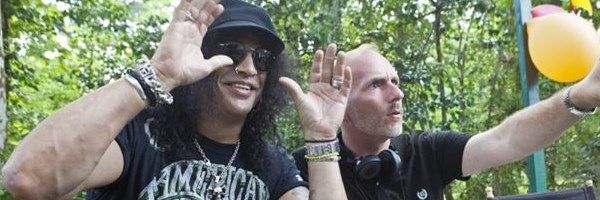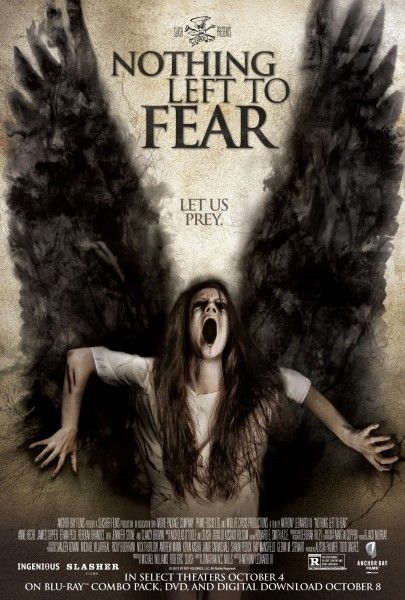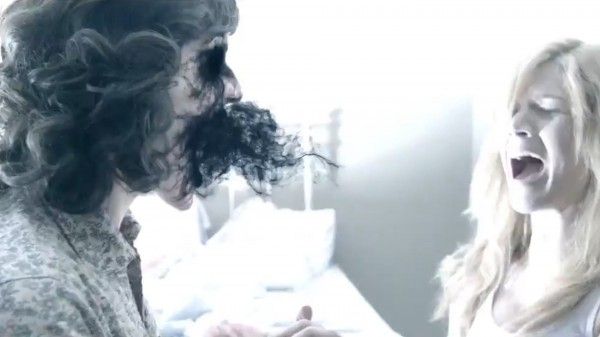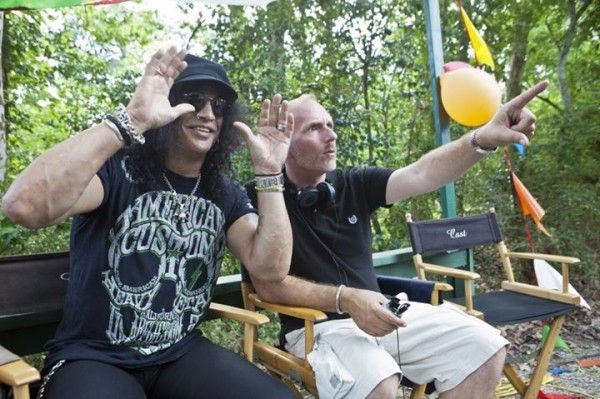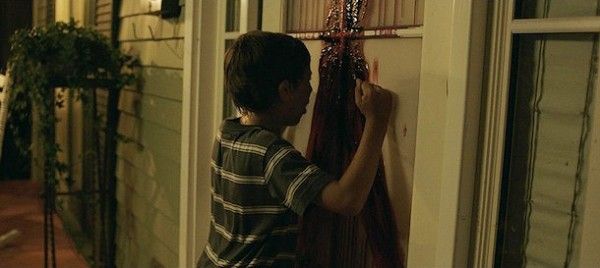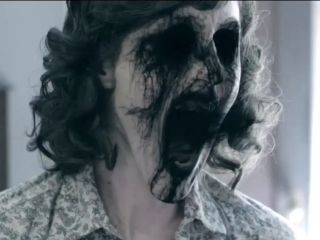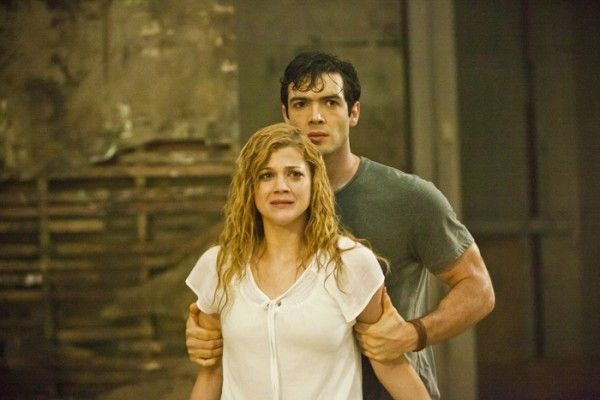From director Anthony Leonardi III, screenwriter Jonathan Mills and producer Slash, the horror thriller Nothing Left to Fear follows Wendy (Anne Heche) and Dan (James Tupper), who move to the small town of Stull, Kansas with their three children (played by Rebekah Brandes, Jennifer Stone and Carter Cabassa), so that Dan can be the town’s new pastor. But they quickly learn that what appears to be a sleepy community of friendly neighbors really has a horrific series of events awaiting them, and that they’ve been marked for a depraved and unspeakable ritual.
At the film’s press day, Anthony Leonardi III and Slash spoke to Collider for this exclusive interview about how they came to collaborate with each other on this film, what drew them to this story, why emphasizing story and characters is so important to each of them, putting such a great cast together, and never backing down from the story they were telling. Slash also talked about where he’d like to take his production company next, and whether he’d ever consider trying his hand at directing. Check out what they had to say after the jump, and be aware that there are some spoilers.
Collider: How did you each come to this project and come to be collaborating with each other?
SLASH: We really got together in a conventional way. We sent the script out to different directors, Anthony being one of them. And then, we met and had an interview [at the Sunset Marquis], and my partner and I both thought that he was great, and that he really put a lot of thought and care into the story. He showed up at the meeting with a really great comprehensive idea of what this movie was gonna be, and all that. I thought it was inspiring.
ANTHONY LEONARDI III: It’s very interesting how we’re from such different sides of the spectrum, but we see eye-to-eye on movie-making. It’s been a pretty amazing experience.
Slash, had you been looking for a movie to produce for awhile, or did this one come along pretty quickly?
SLASH: Well, for about a year, I was being hand fed scripts from the production company that Slash piggybacks on. I think they really wanted to see if I had an aptitude for this. It was their idea that I would make a good producer, based on conversations that we had. That morphed into a more elaborate conversation, and they started giving me more scripts to read than any normal person wants to deal with in one sitting. Of course, the majority of them were either bad or totally in the opposite vein of what I was interested in. Having even just established what I liked and what I didn’t like, set me in the direction that I was going. And the next thing you know, I was left with a handful of scripts that I thought were actually good and that were something I would be able to embrace. This particular one just had all of these different elements. The concept of the story was very simple. I looked at it as a framework for the story, and there were the little details in the middle that were ancillary. It was the basic story that I really liked. I loved the small town, and the whole concept of the priest luring this innocent family into that town for a whole darker and meaningful purpose. I just loved the mystique that it had. So, we just decided to pursue that one. That was three years ago.
LEONARDI: I came with the same approach. The story has never changed. Our focus, when we started working together, was to how best that story, and those were the changes made on top of it. As a writer, it’s always tough because you hand something in, and then the director has to translate it. But, [Jonathan Mills’] story has always been the same. That’s what was great.
SLASH: The writer just hopes that you do the right thing with it, and he seems to be really happy. Look at The Shining. I read that book, and then you look at the movie and it’s the same idea, but it’s almost a completely different thing.
Why was the emphasis on story and characters so important to you, when that’s often secondary in these types of films?
SLASH: That was the one thing that we universally felt that horror films had lost, and we wanted to bring that back. We thought, if we’re gonna do this, let’s really try to bring back what it is that we feel is missing from the genre.
LEONARDI: It was funny ‘cause the original script was much more horror. It was much more about chopping things off, and the script had Slasher Films on it, and I was so scared because I didn’t want to make a slasher movie of this. I wanted to make a very haunting movie. I just thought, “Screw it! I’ll go in and meet these guys and tell them the movie I want to make.” When I told Slash, “I don’t really want to make a slasher movie, but this is the movie,” he was like, “That’s what I want to do.” And since then moment, we wanted to make the same movie.
SLASH: That was the key thing. The shell of the story and the foundation of the story was great. There was a lot of stuff going on in the script. So, there was stuff that we definitely saw eye-to-eye on, with how to trim the fat and make this more of a believable, real thing for the characters, and not so much focused on the obvious, but really getting into what you’re not expecting or what you wouldn’t expect. We didn’t want to make it conventional or predictable. A fucking lightbulb was lit, at that point.
Wouldn’t you say that the best way to legitimize a movie like this is to put Clancy Brown in it?
LEONARDI: Yeah, he’s awesome!
SLASH: He is awesome! We’re all really happy that he was available. For me, when you’re dealing with agents and looking at all of the different casting opportunities, but then also looking at the budget, I think we found a really great mix of people to play the family. And then, Clancy Brown and Wayne Pére, who plays Mason, were awesome.
LEONARDI: He came out of left field and just killed it.
How challenging was it to find believable younger actors?
LEONARDI: Especially with the younger actors, they’re so stereotyped in the horror genre right now. You know who the bitchy girl is and who the slutty girl is. I just kept thinking that I knew people kind of like that, when I was a kid, but I didn’t. People are more of this grey zone. I really wanted to build a family that people could understand, or that was like a family you knew, or that was like your family. You don’t really know who’s going to die or what’s going to happen to who. We didn’t want to stick with the cliches. We wanted to go off-center a little bit to make a really believable situation.
Did you really work hard at making sure you kept this film a slow build up to an ending that you didn’t back down from, at all?
LEONARDI: It’s tough with this genre and this budgets. You usually have one good thing. And we wanted to keep it just a slow build, so that when it takes off, it just really explodes. There were choices we made that, if something was going to stop that momentum, we wouldn’t even put it in. You have to have that build and believability. As soon as you stop and you go, “Oh, that’s a bad effect,” or “Look, that’s cheesy,” then you forget the momentum you’ve been building. So, it was definitely a conscious process to get there.
Did you put a lot of thought into how you’d handle things with the youngest kid being attacked by his sister?
LEONARDI: It goes back to why we went after this movie. It’s a horror movie, but we didn’t want it to be gratuitous or explicit horror. The way we build the family is so that when someone dies, you shouldn’t be happy. You laugh in a movie when someone’s arm falls off, and I have just as much fun, but I didn’t want this story, in particular, to be satisfying when someone was gonna die. These are really unfortunate events, and that’s what helps build Clancy’s character, as well. He has to do this things. So at the end, when you find all that out, there’s more of this weight and burden and grey zone that we’re left in, to make it more of a haunting movie than a movie you forget about really quick. That scene with Christopher (Carter Cabassa) was really tough to shoot. With everything else, we were laughing and having fun on set, except for that one moment. He’s such a little professional actor. He’s really amazing, how he preps his stuff. But, it was really hard to shoot that.
SLASH: I wasn’t there for that, but I can only imagine.
LEONARDI: I was sitting with his mom at the monitor, and it was just quiet. Everyone else who died in the movie, we were laughing and having fun. It wasn’t fun, but it was fun. But with Christopher, it was scary. His sister drags him out of a car.
Slash, you’re at the height of where you can go, as a musician, so was it refreshing to start at the ground level of the film world?
SLASH: It’s great! For me, it has nothing to do with where I stand as a musician or anything, but I’ve obviously been doing it for a long time. It’s exciting, for want of a better word, to be so passionate about something, and then be able to get involved with it. When I was a kid, I used to love to go to recording studios and concerts with my parents. I loved the set-up and I loved the details of what went on before the actual performance. And it was the same with movies. I was always fascinated by the production and everything going on, on set. To be thrust into that medium, at this point in time, is just overwhelming for me. I really, really enjoy it. The great thing about it is that I’m totally naive. It’s very innocent. It’s that early stage where it’s all just love and passion, and there’s really not much else. Talk to me 15 years from now, when I’ve got a few movies under my belt, and we’ll see where I’m at. That’s always stuck with me, with music. I’ve never really gotten jaded about it. I’ve always loved music for the sake of doing it, and the longer I do it, the more I like it. Hopefully, I’ll be able to have that same point of view in this business, or at least with doing this.
Where would you like to take your production company next?
SLASH: Nothing Left to Fear is one very unique and individual film. There are a million ways to go, as far as horror is concerned, and I definitely have images in my mind’s eye of what I want to do. So, I’m looking for ideas or stories or scripts, or something out there that’s inspiring, to go after for the next one. We’ve been talking about it a lot, but I definitely have some semi-formulated ideas, looks and concepts that I want to get into. But, I definitely want to stay in the direction of establishing a real story. First and foremost, that’s the most important thing. The horror aspect is an element the story goes into, but you’re along for that ride. It’s not just opening credits, and then, boom, you’re scared.
Have you thought about directing, at all?
SLASH: Directing is like guitar playing. That’s a unique mind-set and talent, unto itself. I like the idea of putting everything together to make a great movie, but to stand behind the camera and become a director, I’d have to suddenly be inspired to do that. It’s just not in the books, at the moment. Maybe after years of doing this, down the line, I’ll all of a sudden get a wild hair and go, “I can do it!” I’ll direct a music video. No. That’s not really what I’m in it for.
Anthony, what are you looking to do next?
LEONARDI: I think I want to be a little bit broader and not be genre specific. I don’t think I’m gonna do romantic comedies next, but my background is in much more high-concept work. Right now, I have a couple of secret projects and I’m starting to find new stuff that inspires me, whether it be horror or sci-fi or action, or something else. Whatever has that story that speaks to me is probably what I’m going to go after.
Nothing Left to Fea is now playing in limited release and is available on Blu-ray/DVD on October 8th.

